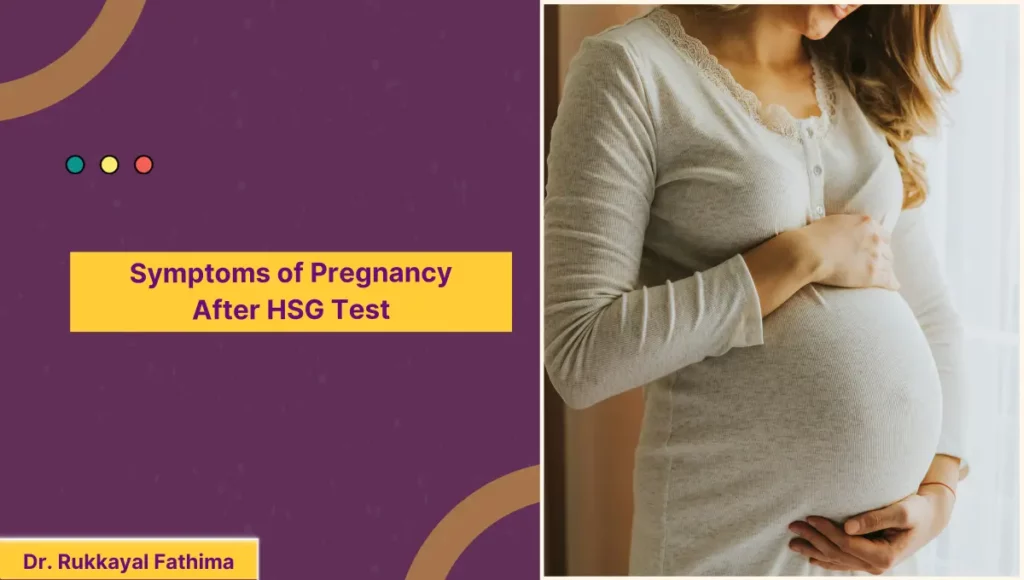An HSG (Hysterosalpingogram) is an X-ray test done to analyze the inner structure of the uterus and fallopian tubes. It is done by injecting a contrast dye into the uterus and taking images of the uterus.
Unlike what many people believe, an HSG does not directly help a woman get pregnant. An HSG is a diagnostic tool that helps doctors identify the issue that prevents women from getting pregnant.
By understanding the issue, doctors can recommend the right treatment option to overcome the issue, thus helping women get pregnant. So, how do you know whether you are pregnant after an HSG test? Continue reading the article to learn some symptoms you can look out for if you are pregnant.
7 symptoms of pregnancy after HSG test
Though HSG tests do not directly increase or decrease your chances of getting pregnant, they help diagnose and treat the issue that causes infertility. This can help you overcome your issue and get pregnant. Below are seven pregnancy symptoms you may experience if you are pregnant.
Missed period
This is one of the most common symptoms of pregnancy. Missing your period after an HSG test can indicate pregnancy. But you can only consider this as a pregnancy symptom if you have had regular periods.
If you are a person who has irregular periods, missing your period doesn’t necessarily mean pregnancy.
Breast changes
Your breasts undergo a lot of changes during pregnancy. This is mainly due to the hormonal changes that are preparing your breasts to feed the baby after childbirth.
Some changes your breasts may experience during pregnancy are tenderness, soreness, swelling, and darkening of nipples.
Nausea and vomiting
Be it in real life or in movies, you might have heard that women experience nausea and vomiting during pregnancy. If you, too, experience these symptoms after an HSG test, it might be a sign of pregnancy.
Fatigue
Your body undergoes a lot of hormonal and biological changes during pregnancy. This can exert a lot of pressure on your body, making you feel tired and exhausted. Experiencing fatigue after an HSG test may also indicate pregnancy.
Frequent urination
Pregnancy can increase the urge to urinate every now and then. If you experience this, it can be because you are pregnant.
Food cravings and aversions
If you are pregnant, you might find yourself hating the food you loved the most and wanting the food you hated before. Food cravings and changes in food preferences are one of the most common symptoms of pregnancy.
Mood swings
This is mainly the work of the hormonal changes that happen in your body during pregnancy. They can cause fluctuations in your emotions and lead to mood swings. One minute, you might be happy, and the next, you will find yourself crying. This is one of the common symptoms of pregnancy.
Early Signs of Pregnancy After an HSG Test
Apart from the above symptoms, there are some symptoms you might experience a few days after fertilization and implantation. These symptoms are hardly noticeable, and some will only last a few days. Below are some symptoms you might experience a few days after implantation.
Implantation bleeding
This is one of the first symptoms you might experience if you are pregnant. Implantation bleeding is the light spotting you might experience when the fertilized egg (embryo) implants in the uterine lining.
Increased vaginal discharge
You will experience a change in the consistency and amount of vaginal discharge if you are pregnant.
Mild cramping or spotting
Along with implantation bleeding, you might also experience mild cramping and spotting. This usually happens during the early stages of pregnancy.
It is important to understand that the above symptoms we discussed can also be caused due to other factors. So, it is best to take a pregnancy test or visit a hospital to confirm your pregnancy.
Conclusion
Most times, the inability to get pregnant naturally is due to some fertility issues that you might not have noticed before. An HSG test can help doctors find out the root cause of infertility and recommend the right fertility treatment to rectify the issue and make you get pregnant.
Understanding the pregnancy symptoms can help you know if you are pregnant and take the necessary care to sustain the pregnancy. You can discuss with your Fertility doctor and learn some pregnancy care tips for a safe and healthy pregnancy.
An HSG test is not usually painful. Some women, however, might experience some mild discomfort or pain similar to period cramps. This pain is temporary and will subside some time after the procedure.
A thin tube with a contrast dye is injected into the uterus during the procedure. So, you might experience slight spotting and abdominal pain after the procedure. But this is just temporary and will subside eventually. So you don’t have to worry too much about it.
An HSG test does not directly affect your chances of pregnancy. However, the procedure helps you diagnose your infertility and undergo the treatment to cure it, thus indirectly increasing your chances of pregnancy.
Any woman who has infertility issues can undergo an HSG test to diagnose the cause of infertility. Below are some cases where you can consider undergoing an HSG test.
- If you have had multiple miscarriages in the past.
- You have been trying to conceive for a year and have failed.
- You show symptoms of uterine or tubal abnormalities.





